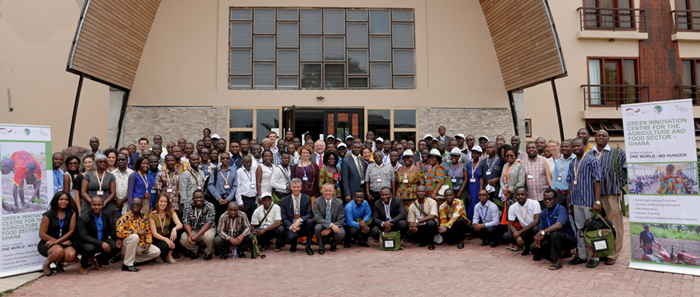 The Green Innovation Centre for the Food and Agriculture Sector (GIC) Project Ghana, collaboratively implemented by the Ministry of Food and Agriculture (MoFA) and the Deutsche Gesellschaft für Internationale Zusammenarbeit (GIZ) GmbH has held a three-day interactive stakeholder meeting in Ada. Over a hundred key actors in the maize and rice value chains participated in the programme.
The Green Innovation Centre for the Food and Agriculture Sector (GIC) Project Ghana, collaboratively implemented by the Ministry of Food and Agriculture (MoFA) and the Deutsche Gesellschaft für Internationale Zusammenarbeit (GIZ) GmbH has held a three-day interactive stakeholder meeting in Ada. Over a hundred key actors in the maize and rice value chains participated in the programme.
The Green Innovation Centre is part of the special global initiative “ONE WORLD – No Hunger,” which is funded by the German Federal Ministry for Economic Cooperation and Development (BMZ). The objective of GIC Ghana is to support smallholder farmers and agribusinesses in the maize and rice value chains through the introduction of innovations, both technical and organisational. The aim is to increase productivity along the entire value chain, create jobs and improve rural livelihoods. GIC operates in four regions: Brong-Ahafo, Ashanti, Volta and Eastern.
Some featured GIC objectives:
- Increase income for smallholder farmers by 30%; increase annual revenue by 25% for up- and downstream actors
- Create 1,000 new jobs
- Decrease the portion of households facing malnutrition by 15%
Since the inception of the GIC in 2015, some successes include:
- 20,000 completed farmer trainings
- 90 demonstration plots established
- Solar hybrid balloon dryers for maize distributed to 15 farmer communities
- Refurbished training centres at Adidome Farm Institute and Wenchi
The event was opened by the Deputy Minister of Food and Agriculture, Honourable William A. Quaittoo. He stated that, GIC is consistent with the Planting for Food and Jobs programme, a priority of the Ministry of Food and Agriculture and urged the project team to ensure that their activities were translated into visible results for the farmers. He urged stakeholders and beneficiaries to embrace the services and technologies being propagated by GIC to increase their yields and profitability.
The welcoming addresses were given by the Head of Cooperation of the German Embassy, Mrs. Verena Wiesner, who highlighted the 60-year cooperation partnership between Germany and Ghana with its emphasis on agricultural development and the Israeli Ambassador, H. E. Ami Mehl. He also enthusiastically welcomed the participants and said, ‘’Ghana is an agrarian country and Israel is excited to share its knowledge and successful experiences, for example in irrigation, to the benefit of all Ghanaians.’’ He also emphasised that farming is only one part of agriculture; in addition to work in the field, farming is also a business and should be treated as a science with many innovations to be implemented for best results. Ghana has huge potential and all stakeholders should work towards making Ghana a leading food export country.
After the official opening ceremony, participants toured the Innovation Marketplace where exhibitors highlighted their activities in the maize and rice value chains. A side attraction of the marketplace was the solar balloon dryer innovated by PensFood Bank.
The stakeholder meeting also had interactive discussions which deliberated on past GIC accomplishments and the future for the selected focus areas over the next five years. The themes covered all the value chain activities of the selected commodities from production to processing and cross-cutting issues including seed systems, farmer business schools, conservation agriculture, rice parboiling, small- and medium-sized enterprises (SME) business loops, mechanisation, and standards.
Discussions throughout the workshop resulted in insightful advice and recommendations, which provided GIC invaluable knowledge from all actors across the rice and maize value chains. The workshop concluded with establishing collaboration opportunities and plans for GIC’s next steps toward the next five years of fruitful partnerships.























